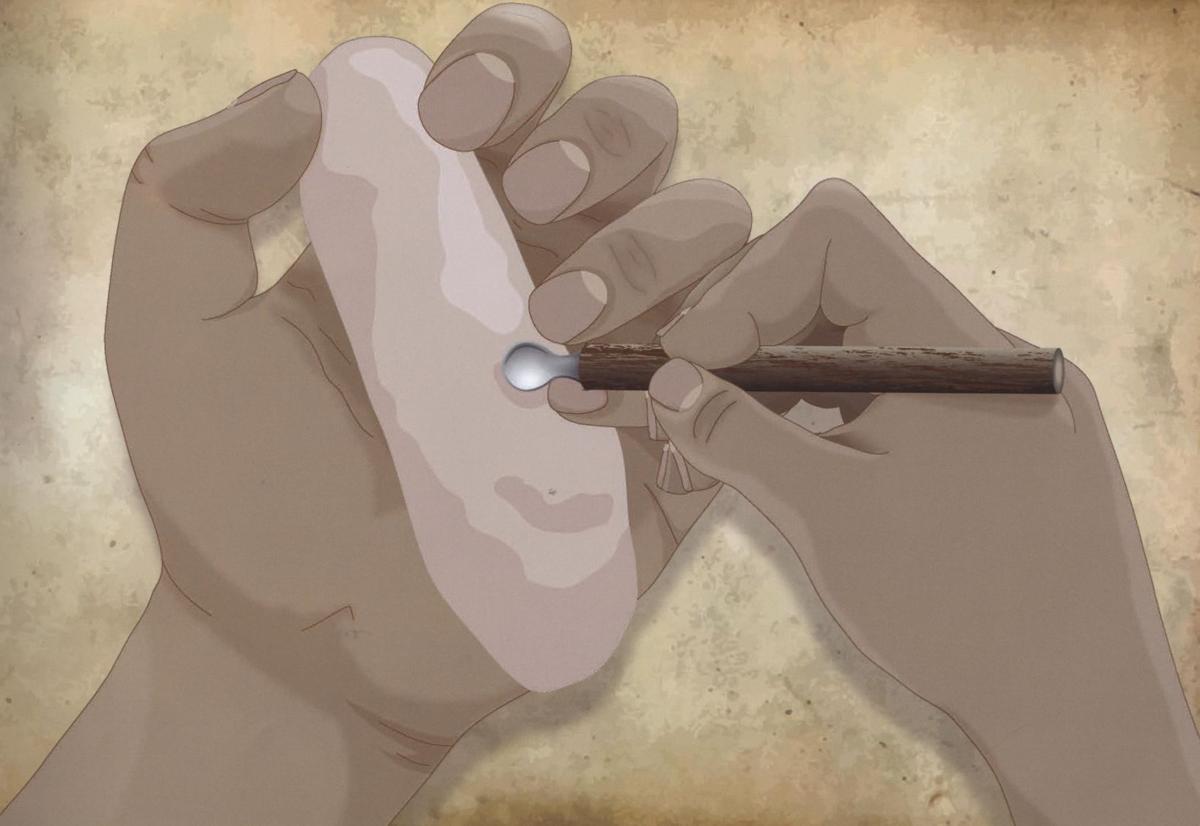Jeff was that guy at the office whose chair had an odd habit of sinking now and then, seemingly at random but somehow always while he was having a conversation with someone. For the first month after he started using that particular chair, he had profusely apologized to whomever he happened to be speaking to at the time of each gravitatious incident. The following month, Jeff had had enough and snooped around the building for a replacement chair. Finding one in a spare conference room filled with marvelous, non-sinking chairs (he tested each), he made the swap and had approximately two days of seated bliss before a conversation was once again intruded upon by his chair sinking toward the ground. It appeared that his chair had been returned to his desk. Jeff spent a couple weeks swapping his chair and having it disgracefully return before he finally gave up. He stopped bothering to apologize when he sank a foot during any sort of parley, and instead would staunchly refuse to readjust the chair until the conversation had reached a clear end. If someone so much as crinkled the corner of their eye at his chair’s antics, Jeff would give them his best So? look.
His wife had suggested he prop the chair up on boxes, or perhaps a short filing cabinet or fridge. Mel always had ill-conceived ideas like that; unfortunately, what he had once considered endearing was by now, after 15 years of marriage, grating on his patience as he found himself telling her to please refrain from spray painting the front door with a skull and crossbones in honor of Halloween, to please put the dead leaves in trash bags instead of lighting them on fire in the middle of their suburban front yard, or even to please refrain from giving cookies to the Girl Scouts every time they knocked on the door, no matter how delicious they were or how fresh from the oven. In the instance particular to his office chair, Jeff explained to Mel, in the kindest way possible, that the chair’s single swivel leg would get in the way of an attempt to wedge a refrigerator down there.
“Can’t you just remove the leg?” she had asked.
“How am I supposed to slide my chair in and out from beneath my desk if it’s on a refrigerator?”
“By attaching wheels to the bottom of the refrigerator. Look, it would save you space—”
“That’s too much work, Mel.”
“Fine, have it your way. Let your chair sink. Heaven only knows what sort of impression that makes on whoever it is you talk to all day,” she said.
“The people I talk to all day already know my chair sinks,” Jeff said, massaging his eyes and the bridge of his nose. He didn’t bother asking what people would think if they came into his small office to find him sitting on a filing cabinet or refrigerator, never mind the fact that the nearest outlet for the refrigerator was across the room—the one near his desk was already taken up with computer plugs and a plug for a machine so foreign to him that he kept it more for the bland mystery of it than for its potential usefulness He would have to rearrange his entire office for that extra two feet-by-two feet space his wife was promising he would gain by the chair-base exchange.
“The people you talk to all day,” Mel was saying, “gave you the chair you have as a joke, a welcome-to-the-office hazing, and you should do them one better by economizing space. Who knows, you could get promoted for your ingenuity.”
Mel had enough ingenuity for the both of them, and that’s why Jeff rarely bothered to think anymore beyond whatever was necessary for his position as an assistant to the county clerk. Which, frankly, wasn’t much.
Jeff had settled into his life, settled for his life, and settled on continuing onward in much the same way, if he could help it. Whatever craving he had for excitement was met on at least a weekly basis by Mel.
On a week when Mel had figured it was a good idea to embroider a detailed, silver map of the United States onto their American flag in preparation for the patriotic summer holidays, Jeff decided to walk to work, promising Mel he would pick up some muffins on his way home. It was a promise he fully intended to keep, for although he was perpetually short on patience with his wife, he did love her and didn’t want her to have to go even one Sunday morning without her customary blueberry muffin with streusel on top.
It was raining that day, but since Jeff had never owned an umbrella, and since he had already decided upon walking, there was little he could do about it. He tossed his neighbor’s newspaper on top of his head to protect his hair from the rain, but then remembered how the ink tended to smear and thought better of it, stopping at the corner of the block to deliver the paper to the small beagle the family who lived there had recently adopted. The pup wagged his tail in overdone gratitude and began tearing the paper to pieces so that it would resemble the one already eroding on the front steps of the house.
There were few people out that morning, and of those who were, only Jeff seemed to not have an umbrella in working condition. He walked beneath every tree he saw in an effort to make up for it, but there simply weren’t enough full trees along the way to protect his now-sopping clothes from the rain. So Jeff was soon forced to give up any effort to avoid the drizzle and instead focused on avoiding the deepest of the puddles. It was hard to tell if his socks were wet because of his shoes or his dripping pant legs.
He opened the door to the county office thinking about how he hadn’t realized it was so far from his home, then crossed the stone floor of the lobby toward the elevators.
His elevator-mate was an aging black fellow wearing a fedora, and he stood beside some luggage and an umbrella. The umbrella, which was lying on top of the man's luggage, was blue and opened slightly to air out.
They exchanged good mornings and stared together at the elevator doors.
And then they fell.
This wasn't the usual slow, stomach-churning sinking into the basement; no, this was something that dropped Jeff to his knees in a puddle on the floor and nearly impaled him with the black man's umbrella, something that made him wonder that his last thoughts on this earth were going to be a four-letter word his mother would throttle him for once he was close enough to the pearly gates for her arms to bridge the distance.
But then, maybe such words are the last thoughts through many people's minds.
It certainly wasn't the last thought through the black man's mind. His thoughts weren't coherent enough to be notable at all without his morning coffee to give them a leg up.
They slammed against the bottom of the elevator shaft, and Jeff was jarred onto his belly in the darkness. Through the pain and dark, his thoughts centered on Mel and what his last words to her would be—something heroic, he hoped, or else something novel. Something that would help her world continue to revolve now that he wouldn’t be in it.
He dragged his hands into his coat pockets, fumbled out a pen and, energy failing, penned her a note on the surface closest to where his hand happened to fall.
He heard the other man move, may God bless his soul and Jeff’s, and then gave up on living.
But perhaps he gave up too soon.
When Jeff woke up, someone was slapping him. Death isn’t in the business of slapping people to make sure they have truly died, he was pretty sure, and so he blinked his way through the pulsing bass in his head and saw the ceiling panel lights of the county office basement.
“Hey buddy. What’d you do, drop one story and figure your number was up?” The slapper gave half a smile of amusement. His eyes looked a little concerned, though, as those darn fingers starting poking everywhere on his body, causing pain to strike up wherever they passed.
“Stop,” he begged. “Pain.”
“Staff of life, sir, staff of life. Hey,” he said, tugging a little on Jeff’s tie and flipping it over. “What’s this?”
Jeff moved his eyes over to look and saw that his pen had failed to give off much ink when he was writing his last words.
All that was written was “chai,” in bad penmanship.
“Shopping list,” he said. He was becoming sensible enough to be embarrassed. “Other guy?”
“Oh, this is his floor. He’s fetching some paperwork or something.”
More embarrassed.
“Yeah, don’t worry about him. He’s been in falling elevators before. Takes them in stride.”
“He what?”
“Doesn’t matter. Can I have permission to use your phone to call someone to come get you?”
“Yeah.”
“This your wife?” The slapper flashed him a picture of Mel.
Jeff tried to nod, but it didn’t really work, and he just blinked instead. Then he fell asleep.
He woke up again in the car, his face smashed up against the passenger side window and the seat belt halfway up his stomach from his slouched position. He groaned.
Mel was the one driving. “I asked for muffins, not chai tea, Jeff,” she said, her words clipped and tart. “Blueberry muffins.”
Then she glanced over at him and sighed, handing him his tie. “But here, I finished up the list for you.”
The back of his tie now read "chai, blueberry muffins, OJ, baklava, Cheerios."









